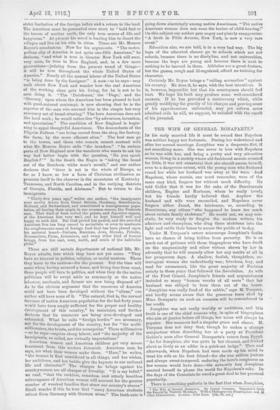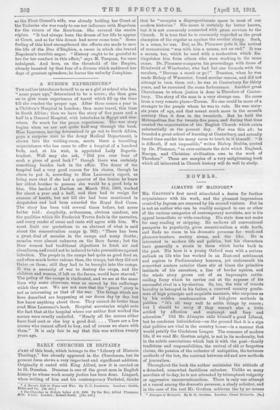THE WIFE OF GENERAL BONAPARTE.*
IN his early married life it must be owned that Napoleon was neither happy nor fortunate. During her widowhood and after her second marriage Josephine was a desperate flirt, if not something more. She was never in love with Napoleon as he was with her, and being a pretty and very attractive woman, living in a society where old-fashioned morals counted for little, it was not unnatural that she should amuse herself, even to a dangerous extent, with the young men who fluttered round her while her husband was away at the wars. And Napoleon, whose morals, one must remember, were of the same easy kind, forgave her without mach difficulty. He told Collet that it was for the sake of the Beauthammis children, Eugene and Hortense, whom he really loved; but his friends hardly believed that. Anyhow the husband and wife were reconciled, and Napoleon never forgave either Junot, the talebearer, or, according to Bourrienne, any others "who happened to know too much about certain family skeletons." He would not, we may con- clude, be very ready to forgive the modern writers, his admirers and champions, who drag those skeletons into the light and rattle their bones to amuse the public of to-day.
Under M. Turqnan's eevere microscope Josephine's faults have no chance of being bidden from posterity. He is so much out of patience with those biographers who have dwelt on the magnanimity and other virtues shown by her in adversity that he will scarcely allow her any merits at all in her prosperous days. A shallow, foolish, thoughtless, ex- travagant woman she undoubtedly was ; frivolous, lazy, and mad for amusement, like the great majority of Parisian !society in those years that followed the Revolution. As wife of the First Consul, Josephine's friends and acquaintances included so many "human wrecks of all sorts" that her husband was obliged to turn them out of the house. " Josephine was really fond of the rabble," says M. Turquan, and hardly seems aware that the generous tears shed by Mme. Bonaparte on such an occasion will be remembered to her credit.
Josephine was not really worldly or ambitious, and this truth is one of the chief reasons why, in spite of biographers who aim at justice before all things, her name will always be popular. Her manners had a singular grace and charm. M. Turquan does not deny that, though he makes a strange comparison when describing her at a party at President Gohier's soon after General Bonaparte's return from Egypt. " As for Josephine, she was quite in her element, and frisked abort as lively as an adder in a quick-set hedge." Then and afterwards, when Napoleon had once made up his mind to treat his wife as his best friend—for she was seldom jealous and always sweet-tempered, enduring the hero's roughness as few women would have done—the naturally lazy Josephine exerted herself to please the world for Napoleon's sake. In the days of the Consulate he owed a great deal to her personal popularity.
There is something pathetic in the fact that when Josephine,
• The Wife of _General Bonaparte. By Joseph Turquan. Translated from the French by violate Montagu With With a Photogravure Frontispiece and 16 other Illustrations. London: John Lane, [12s. lid. net.] as the First Consul's wife, was already bolding her Court at the Tuileries she was ready to use her influence with Napoleon for the return of the Bourbons. She revered the ancien rdgime. "It had always been the dream of her life to appear at Court, and so far this dream had never come true." Some feeling of this kind strengthened the efforts she made to save the life of the Duo d'Enghion, a cause in which she braved Napoleon's terrible anger. " History ought to be grateful to her for her conduct in this affair," says M. Turquan, for once indulgent. And here, on the threshold of the Empire, already haunted by that fear of a divorce which saddened her days of greatest splendour, he leaves the unlucky Josephine.







































 Previous page
Previous page